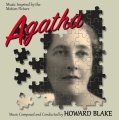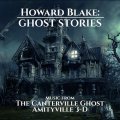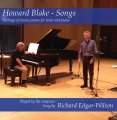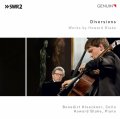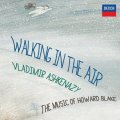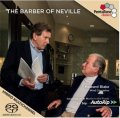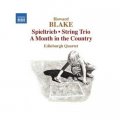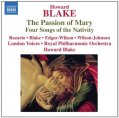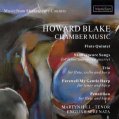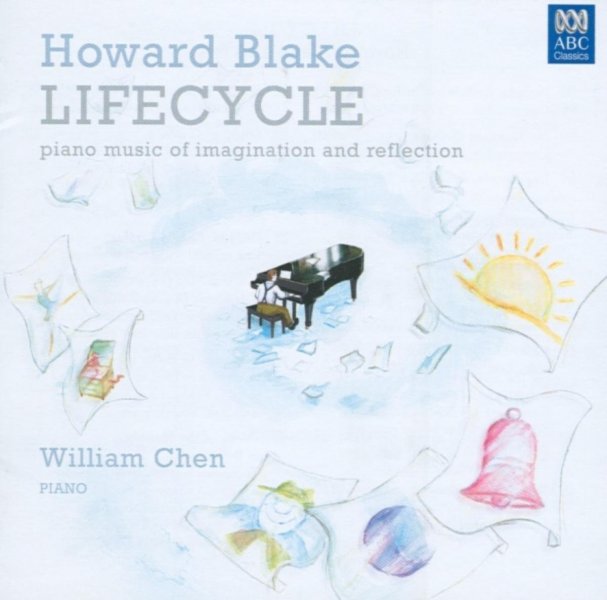Walking in the Air (extract Lifecycle)
op.489u
(1996)
Published by: Highbridge Music Ltd
Instrumentation: Piano
[
Key to Abbreviations]
Duration: 2:48
Sheet Music Available
Instrumental / piano score for sale
Walking in the Air is available singly as a booklet from https://www.highbridgemusic.co.uk/onlinestore (or by enquiry from anna@annamenzies.com).
It is also one of the pieces in 'Lifeycle' a collection of 24 piano pieces by Howard Blake which is available for sale complete as a book, by enquiry to anna@annamenzies.com
All sheet music for "The Snowman" and "Walking In The Air" since 2010 is published and available from Chester Music Ltd, part of The Music Sales Group, www.chesternovello.com It can be purchased online from MusicRoom.com, or from music retailers.
"Walking In The Air" is also available in a concert piano-only version arranged by the composer direct from Highbridge Music as part of the collection of piano pieces called "Lifecycle", available form Amazon or from Highbridge Music.
Recordings Available
1. Recorded by William Chen as one of the items on 'Lifecycle' ABC Classics. Available from Amazon
2. Recorded as one of the works on the album 'WALKING IN THE AIR - THE MUSIC OF HOWARD BLAKE' performed by VLADIMIR ASHKENAZY and released on March 3rd 2014 on Decca Classics 478 6300 www.deccaclassics.com www,vladimirashkenazy.com
Howard Blake describes 25 years of The Snowman animated film and 10 years of The Snowman Stage Show at Sadler's Wells Peacock Theatre in London's West End and plays "Walking in the Air". View the recording here.
The classic original Columbia album conducted by Howard Blake with treble soloist Peter Auty and narration by Bernard Cribbins is available from Sony Music Entertainment CDX71116CD, Amazon and retailers.
The 2010 DVD film of The Snowman Live Stage Show narrated by Joanna Lumley is available from Sony Music Entertainment, CDR 81267; also from Amazon and retailers.
Reviews
Walking in the Air: VLADIMIR ASHKENAZY PLAYS THE PIANO MUSIC OF HOWARD BLAKE
Reviewed by: Robert Matthew-Walker Howard Blake The Snowman – Walking in the Air, Op.489u The Changeling – Music Box, Op.489 The Duellists – Laura, Op.604 Prelude for Vova, Op.540 Speech After Long Silence, Op.610 Eight Character Pieces, Op.338 Dances for Two Pianos, Op.217a* Sonata for Two Pianos, Op.130* Piano Fantasy, Op.1 Three Easy Pieces, Op.1b Romanza, Op.489o Haiku for Yu-Che, Op.567 Parting, Op.650a Vladimir Ashkenazy & *Vovka Ashkenazy (pianos) Recorded March & June 2013 in Potton Hall, Dunwich, Suffolk, England CD Number DECCA CLASSICS 478 6300 Duration 81 minutes Review Date June 2014 Whence inspiration? The extraordinary, vital spark of artistic creativity – that which sets the artist off on a new journey of creation – from where does it come? Clearly, from within the mind (or so the interested observer will believe), but some aspect or combination of circumstances must surely exist at the moment an idea pops into the head as the composer might say. On walking down the road, we all might hum a tune to ourselves, and with little else to engage us perhaps our brain’s musical area might bring to mind a melody matching our mood and the tempo of our walking-pace: eighty years ago, Constant Lambert wrote of “the appalling popularity of music”, citing the sounds coming from the open windows of adjoining houses with their radios on, accompanying the town-dweller out for a stroll, each step on the paving stone coinciding with a bar of music. It’s probably as true today as it was then, although it’s more the mobile phone that carries the music to us (and others!), but without that outside stimulus Lambert’s notion of music accompanying our daily walk still holds good, even if we might wonder what tunes came unbidden into Karlheinz Stockhausen’s mind as he negotiated the winding Bergstrasse in Kürten, such a concept perhaps needing a greater leap of the imagination than most people possess. It’s probably truer to say that musical people from any cultural background (and we don’t have to define ‘musical’ people, do we? – for Hans Keller, such people are those who need to experience music frequently, as an important part of their lives, not those who take it or leave it) are those who probably are more prone to hum tunes to themselves, but if the comfort zones of today’s commuters, as exemplified through their personal earpieces, replace such spontaneous creative experiences with the reassurance of music they know already, then that creative area of the brain might wither and die through atrophy. Howard Blake. Photograph: Tim Motion After all, you cannot think of one tune if another is being fed into your brain. It may be possible, but it’s surely more difficult. So if you’re walking your dog in the park and, suddenly, unbidden, a tune comes into your conscious mind – one that you’ve never heard before and which catches your imagination – such an experience, surely, is a moment of inspiration. Tchaikovsky would enter his study each morning at 9 o’clock to begin writing music – composing, copying or revising an existing work, or orchestrating another, or whatever: keeping the brain’s channels of communication open for when his inspiration called. As he said: “My muse knows to contact me at that hour” (or something similar), but not every composer is as regular in those habits as was Tchaikovsky – although Britten, it seems, possessed a similar work ethic. Inspiration can strike at any time: Elgar asked his driver Dick for the Ordnance Survey map in the car to scribble down the opening of the Fifth Pomp and Circumstance March which had suddenly come to him when they were out for a drive, and Stravinsky is known to have used a restaurant menu for a similar purpose. The important thing, surely, is to capture that inspiration on paper, or at least in some permanent form, before it disappears; Turner carried a sketchpad for the same reason, and there must be very many instances of artists, in whichever medium, being desperately keen to capture that moment. Not all composers have permanent memories for such ideas, but Howard Blake has – and we may imagine he thanked his lucky stars one sunny day when, out walking his dog, a tune arrived in his mind. This was in the early 1970s, soon after Blake (born 1938) had resolved to abandon the constant pressures of composing commercial music to order, often at a few days’ notice, which had consumed his working life for a good many years. At first, he was not quite sure what to do with the tune, although he knew it was a good one. Years later, in 1982 in fact, he realised it ideally fitted a Channel 4 animated film of Raymond Briggs’s picture-book story, The Snowman. It soon became a hit, not only in countries where the film was shown; it has been televised every Christmas since; the CBS Masterworks album went platinum; the EMI single, sung by the young Aled Jones, reached the top of the singles chart, and the two-act ballet version has been staged by Sadler’s Wells in London for fifteen years running, becoming as much a part of Christmas as Tchaikovsky’s The Nutcracker. Seeing The Snowman at London’s Peacock Theatre over a dozen years ago, I described the ballet in Musical Opinion as a “masterpiece” – as a stage show, it certainly is, and remains so: the following year, I took my three-year-old granddaughter to see it, and she sat entranced. Vladimir Ashkenazy. Photograph: Keith Saunders ‘Walking in the air’ may have brought Howard Blake fame, and financial stability, but such is the nature of today’s compartmentalisation of what an artist can or cannot do, or what they ought or ought not to be doing, that society nowadays appears to have taken the view that, once tagged with a particular label (rightly or wrongly), a composer cannot be perceived to be just as good in another area, and if they venture to do so, a part of the critical fraternity has to put them in their place. Quite why this should be so may tell us more about the critics than about the artists involved. In recent decades we have seen a type of ‘cross-over’ from pop and rock to what might be broadly termed ‘classical’, yet perhaps it was always thus: ‘popularity’ does not – indeed, cannot – always equate with artistic inferiority, and ‘ivory-tower’ modern composers are not ‘better’ than popular ones simply because their music does not conform to the familiar or customary. It may take a while to remove such blinkered attitudes, for as Schoenberg said: “A Chinese philosopher speaks Chinese: the question is, ‘what is he saying?’”, and whilst we don’t necessarily have to agree with Leonard Bernstein’s statement that “I prefer great rock ‘n’ roll to bad Beethoven” (pity no-one asked him for chapter and verse), the fact that Sir William Glock gave Soft Machine the first-ever late-night BBC Prom in 1970, indicated a breadth of – at least – musical curiosity, if not acceptance, that we would do well to emulate. For Howard Blake, composition has been pretty much a compulsion for most of his life: “I had a local piano teacher, and I’d make up tunes for my family at Christmas and birthdays. Nobody told me to do it, I just wrote tunes, and when I was about eleven, I wrote a march and took it to my teacher who asked, ‘Where did this come from?’. “I wrote it”. At first he didn’t believe me. But he realised I was serious, and took me through all of Kitson’s harmony and counterpoint books. I loved it.” From then on, Blake knew he liked writing music more than anything, although his father “would not have entertained the idea that I could become a musician”. His mother was musical and played the piano and violin very well. “She encouraged me, and through her I started the piano. I worked hard ... getting Grade VIII with distinction. The Hastings Festival – the only Southern England festival offering a Royal Academy of Music scholarship – was the first time I entered any competition. I went in for the Bach Prize, the Beethoven Prize, the Chopin Prize and the Academy Scholarship Prize – and I won all four. Although I thought I might make a concert pianist, I still wrote music, but nobody encouraged me much. At the Academy I chose organ as a second subject, but during the interview the subject got round to harmony, and I was told to bring in some original work. I brought a four-movement orchestral suite, and they said, ‘Shouldn’t you be studying composition?’. It had never occurred to me!” And so Blake became a composition student of Howard Ferguson. There are few living composers who possess the combination of fluency, technical ability and melodic inspiration as Howard Blake does, so when such a greatly distinguished artist as Vladimir Ashkenazy makes a recording of his piano music, on which he has his son Vovka partner him in works for two pianos, we would do well to abandon any prejudices we might harbour and listen. The recital opens with ‘Walking in the air’; that simple tune, as a piano piece, continues to exert its haunting influence, and Ashkenazy’s phrasing raises it to the level of a minor masterpiece. This is followed by two other pieces, originally used as part of film scores: ‘Music Box’ from The Changeling (the 1980 horror movie, starring George C. Scott as a bereaved concert pianist), and ‘Laura’ from The Duellists (Harvey Keitel and Keith Carradine), a score which won the Special Jury Prize at the 1981 Cannes Film Festival. These two short concert studies (for, divorced from the screen, that is what they are) are given with much refinement by Ashkenazy, as does the succeeding item, Prelude for Vova (Vladimir Ashkenazy himself). The unusually entitled Speech After a Long Silence was also requested by Ashkenazy, an eight-minute test piece written for the 2011 Hong Kong International Piano Competition, played by each competitor in round four of the competition. Blake has said that Ashkenazy’s performance is “finer than I could have dreamed of”. In structural terms, the one composer it brings to mind is Sibelius. The Eight Character Pieces were also suggested by Ashkenazy, in 1975, following what Blake describes as “an extraordinarily brilliant Scriabin recital at the Queen Elizabeth Hall”. The work overall (22 minutes) is a late-20th-century Carnaval (the third – and longest – piece, ‘Impromptu’, is a truly fine example of Blake’s idiomatic writing, as well as being superbly expressive). The Character Pieces were eventually incorporated into Blake’s Lifecycle of 1995 (24 pieces, each in a different key), but the work in its original form makes a perfectly satisfying and coherent composition. Two very different pieces for two pianos follow: nine comparatively brief Dances, almost forming a collection of ‘encores’ in lighter style, succeeded by a major work by any standards, Sonata for Two Pianos (1971) in four movements, which in the finale demands (and gets here) considerable virtuosity from both players. Then comes a group of very early solo pieces: Fantasy, composed in 1955 at the age of sixteen (“rediscovered for this album”), a simple broad ABA structure, declares his natural compositional gifts in no uncertain manner, and Four Easy Pieces from the following year (written as a birthday present for a girlfriend, who apparently turned both composer and his music down), but delightful miniatures. Vladimir Ashkenazy reveals all there is to be found in these early pieces, and this excellently recorded recital continues with Romanza, inscribed to the pianist (and his wife), another extremely beautiful piece, based upon early material – a succinct morceau de fantasie, perhaps. The programme ends with two items, just 70 and 80 seconds in duration respectively, and perhaps the most personal of Blake’s piano pieces to appear in recent years. They form a fitting addendum to a recital of eminently worthwhile music by a composer whose more-serious works – in particular his concertos – manifestly deserve to be heard more frequently. It is a pity, though, that Decca’s presentation is poorly packaged, for nowhere on the front cover is the word “piano” given – Ashkenazy might be conducting Blake’s orchestral music; the layout is childishly feeble, and omitting Vovka’s name from the cover is a deplorable oversight. The opus number of the Eight Character Pieces is also omitted. It is worth mentioning that Sir Neville Marriner and the Academy of St Martin-in-the-Fields are to give a concert devoted to Howard Blake’s music on November 25 at the eponymous London church, including the world premiere of a work for double string orchestra, the melodic inspiration of which will not be hard to seek. Decca Classics
ROBERT MATTHEW-WALKER,
6/2014
Walking in the Air - The Music of Howard Blake: Vladimir Ashkenazy
image: http://assets4.classicfm.com/2014/14/walking-in-the-air-blake-ashkenazy-1396850885-old-article-0.jpg
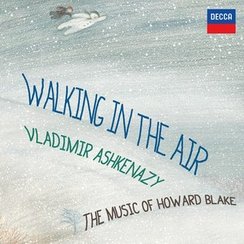
A tuneful and enjoyable collection from two masters. Album of the Weekend, 12-13 April 2014.
The great pianist and conductor Vladimir Ashkenazy has been friends with the composer Howard Blake - best known for The Snowman soundtrack - for many years.
On this unique and maybe unexpected album, there are no fewer than nine world premiere recordings including Blake's music from Ridley Scott’s film The Duellists and a prelude written especially for Ashkenazy, made out of his initials.
Not surprisingly, 'Walking in the Air' is a stand-out track on this generous 80-minute collection.
Blake's compositions are attractive and accessible and Ashkenazy's joy at playing his friend's music is evident on this album
Read more at http://www.classicfm.com/artists/vladimir-ashkenazy/album/walking-air-howard-blake/#TdszXW1pKogwxgWL.99
Classic FM,
12/4/2014

 Highbridge Music Ltd.
Highbridge Music Ltd.
